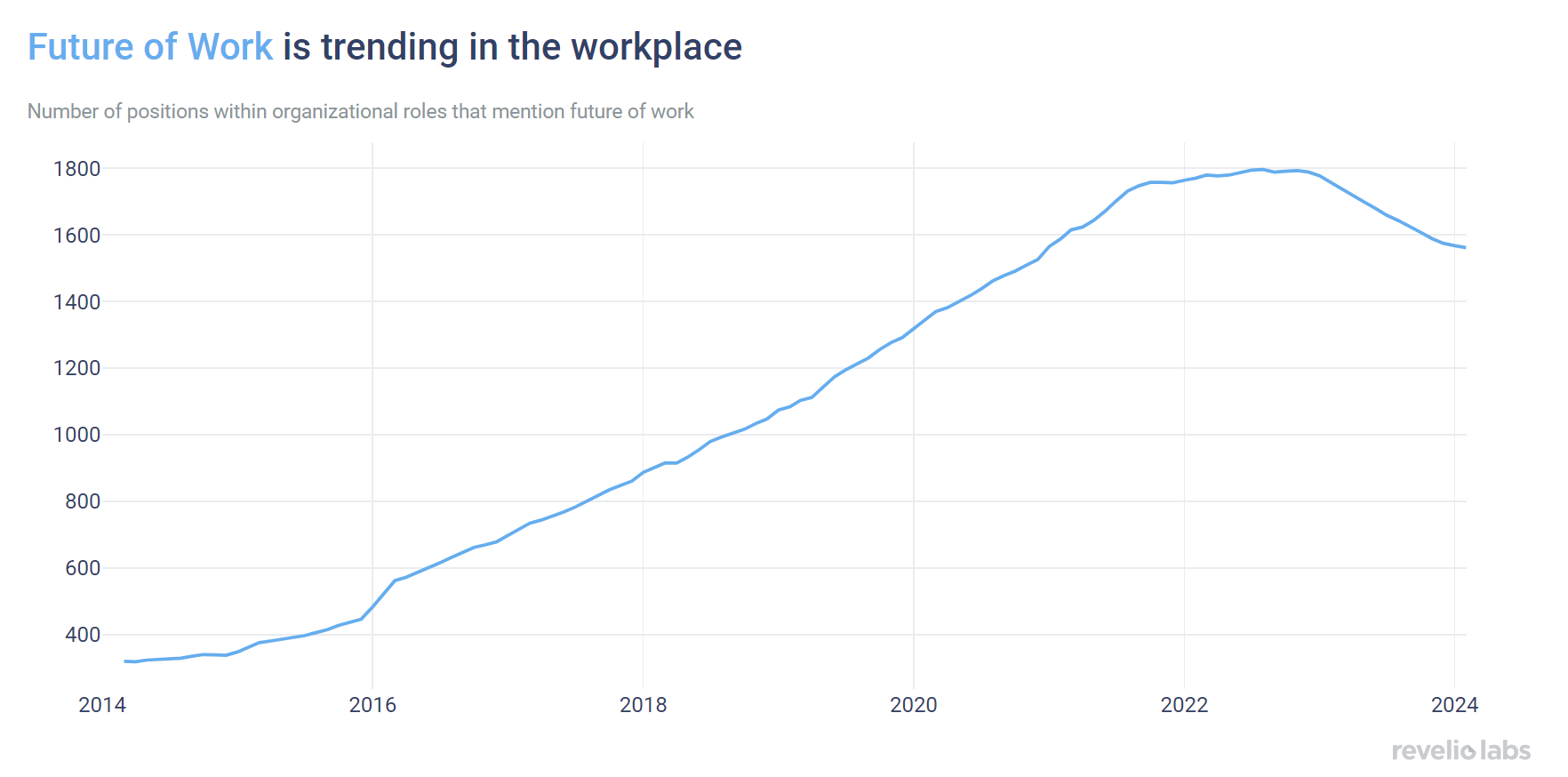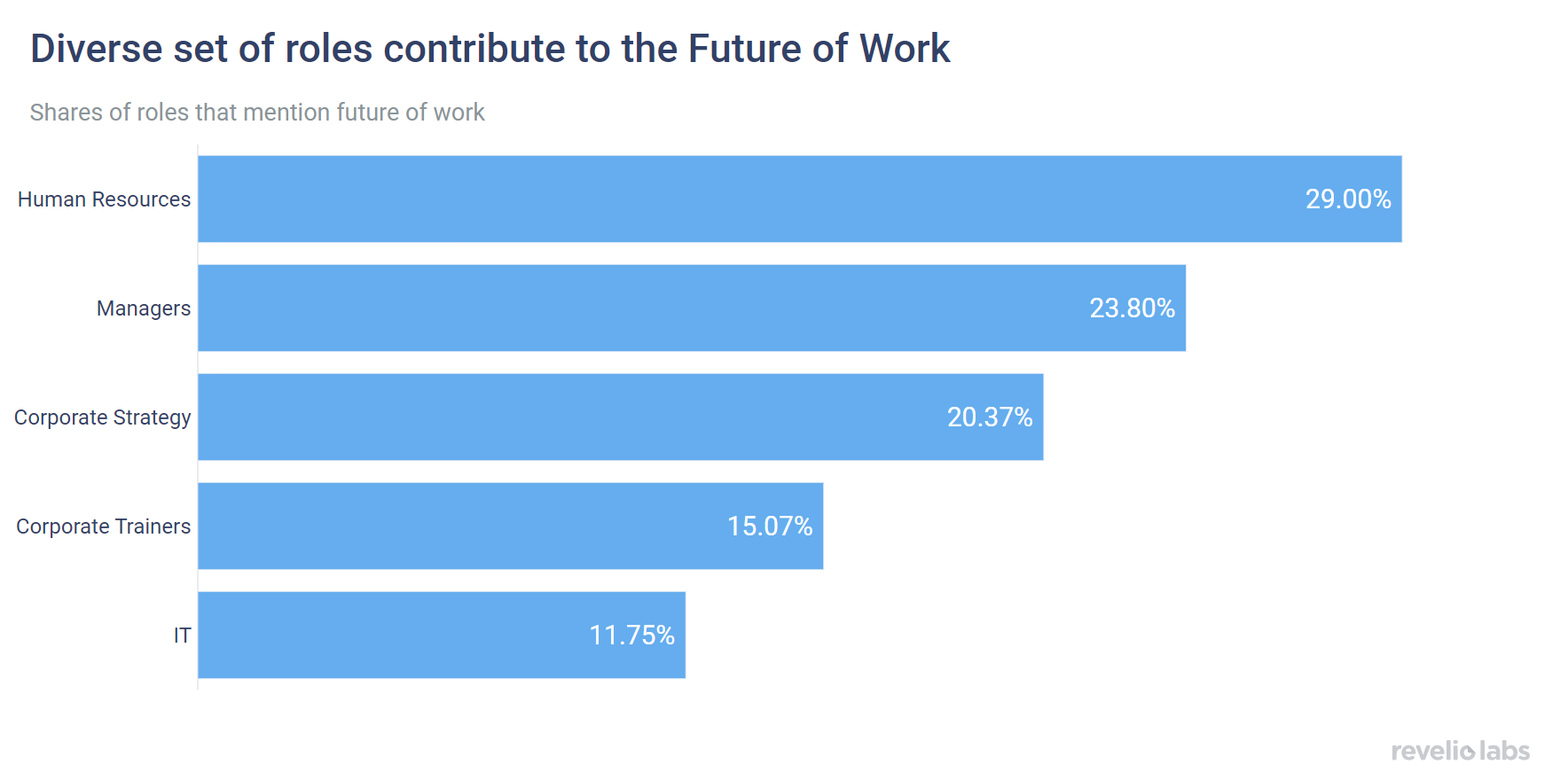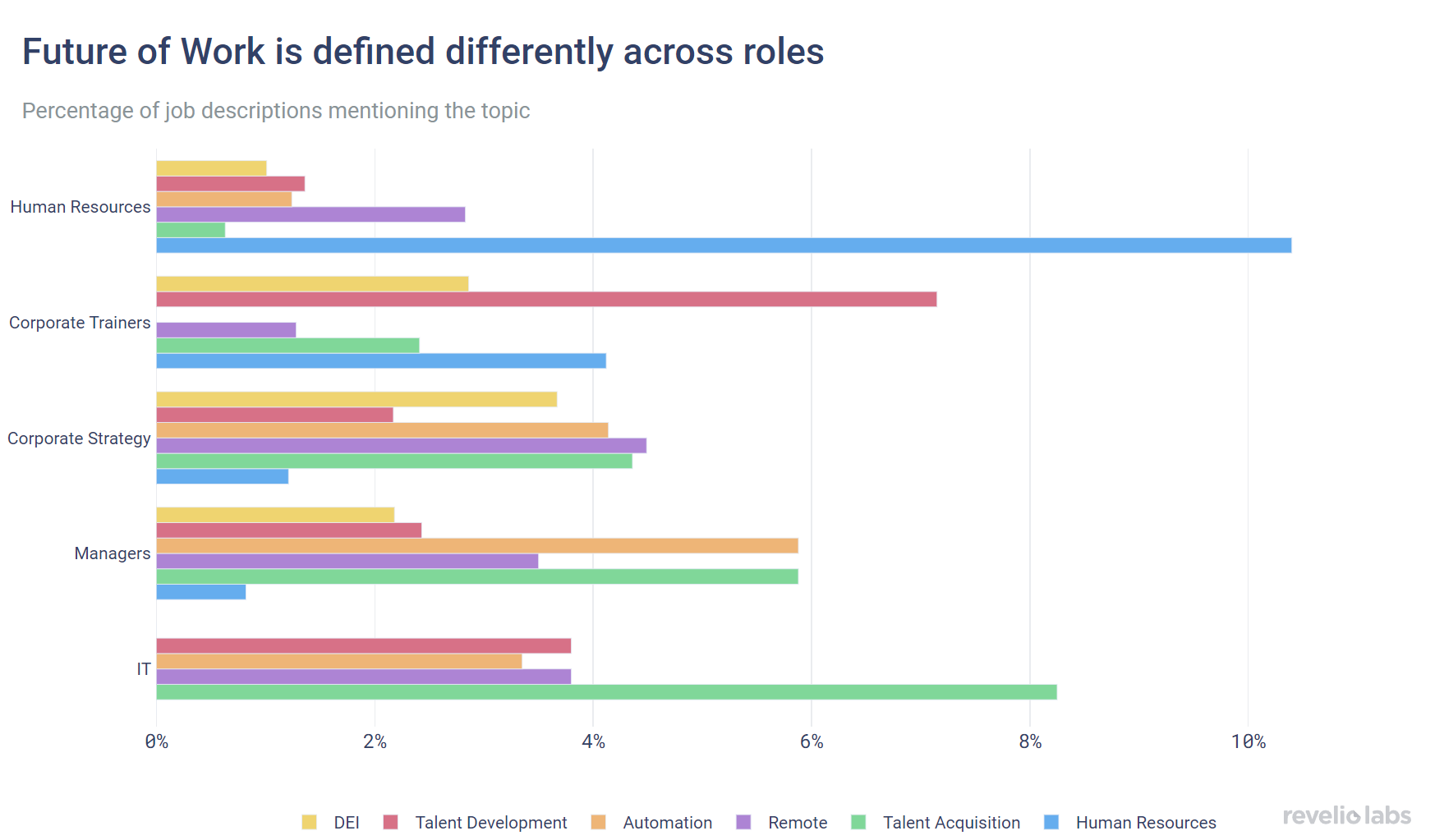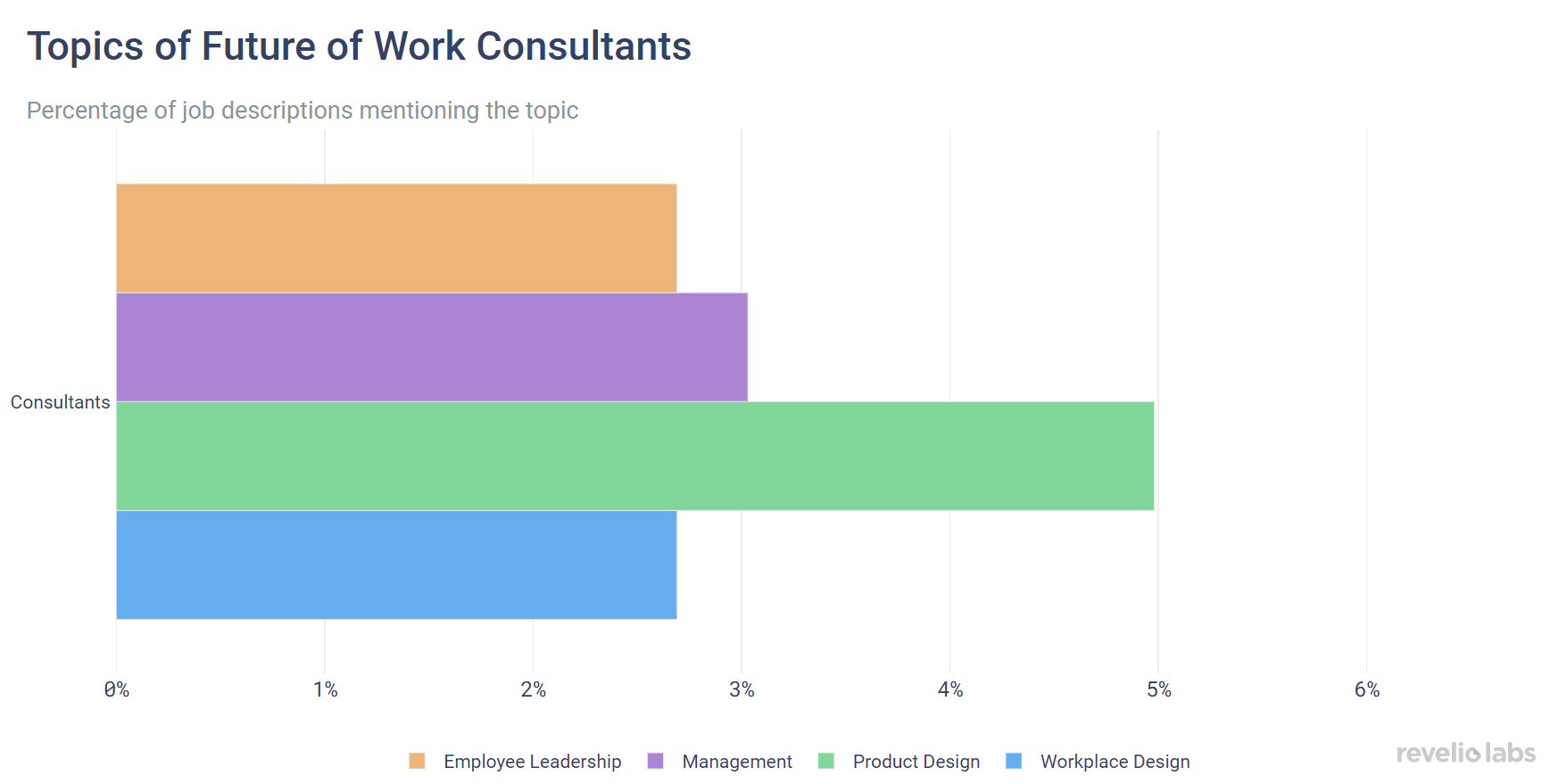Is the Future of Work Lost in Translation?
The future of work employees might need a Rosetta Stone to talk to each other

The number of resumes and jobs mentioning the “Future of Work” (FoW) has surged in the last decade. FoW is multidisciplinary, mentioned not only by HR professionals and corporate trainers but also in resumes of IT, Managers, and Corporate Strategists.
Yet, those in FoW jobs may often occupy a language “island” relative to FoW jobs in other functions.
FoW is a real distinction, not just a buzzword. Those who mention FoW focus on distinct work activities relative to their colleagues within the same discipline.
Jobs that address the future of work must anticipate work and organization transformations and inform and prepare workers and leaders for these changes.
The increasing pace of work transformation is evident in the surge of gig work, demands for increased work flexibility, the institutionalization of remote/hybrid work accelerated by the pandemic, and the increasing integration of robots and Generative AI with human workers. It should come as no surprise that the number of resumes mentioning the “Future of Work” has surged over the last decade, with a slight decline recently, possibly due to layoffs and changing priorities.


Optimizing the future of work would ideally feature collaboration across multiple disciplines and corporate functions including HR, IT, managers, corporate trainers, and corporate strategists. Effectively, all these job functions indeed mention “Future of Work” in their profiles to high degrees.


Sign up for our newsletter
Our weekly data driven newsletter provides in-depth analysis of workforce trends and news, delivered straight to your inbox!
Do Different Disciplines Speak the Same “Future of Work” Language?
Surging attention to the future of work across multiple disciplines is encouraging, but effective collaboration requires more: It requires at least a shared language and vision. Do different disciplines use a common language to describe their future of work activities? Or, do they use very different concepts when they focus on the future of work?
The thought experiment is: “Imagine that someone from one discipline walked down the hall (or joined a Zoom call) to talk about the future of work with someone in their organization from another discipline. Would the two people from different disciplines speak the same language?”
To answer that, we looked into the job descriptions emphasizing “Future of Work,” and then extracted frequently appearing topics in each discipline. In line with our thought experiment, we have focused on jobs in corporations, excluding freelancers, content creators, consultants, and venture capitalists.
Our results suggest that different disciplines seem to speak distinct languages and focus on varying aspects of the future of work. The plot below depicts the six topics that appeared most prominently in jobs emphasizing the “Future of Work” across IT, Human Resources, Corporate Trainers, Managers, and Corporate Strategy.


Notice the rather stark differences, even among those who identify strongly as “Future of Work” in their job titles and descriptions.
- Human Resource professionals mention all six topics but with an extreme dominance of “Human Resources.”
- Corporate Trainers mention five of the topics, with the greatest emphasis on “Talent Development,” followed by “Human Resources,” with less emphasis on “Talent Acquisition,” “Future of Work & DEI,” and “Remote.” They do not mention “Automation.”
- Corporate Strategists mention all six topics with similar frequency, with a slight emphasis on “Remote,” “Talent Acquisition,” “Automation” and “Future of Work & DEI.” They mention “Human Resources” least frequently.
- Managers mention all six topics, dominated by “Automation” and “Talent Acquisition,” with moderately frequent mentions of “Remote,” “Talent Development,” and “Future of Work & DEI.” The topic of “Human Resources” is least emphasized, similar to Corporate Strategists.
IT professionals mention only four of the topics, dominated by “Talent Acquisition,” and then “Talent Development, “Automation” and “Remote.”
Do any topics provide common ground between the groups?
- “Human Resources” dominates Human Resource jobs, but it does not appear to be a useful bridge to other groups. Only Corporate Trainers emphasize this topic.
- “Remote” is mentioned in about 3% of Human Resources jobs. This topic provides some common ground because it occurs in more than 2% of the job descriptions of all other disciplines. The “Remote” topic offers less common ground with Corporate Trainers.
- “Talent Acquisition” offers common ground between all the groups, being mentioned in more than 3% of job descriptions, and dominating the IT, Manager, and Corporate Strategist groups. Ironically, this topic is much less frequently mentioned by the Human Resources group, suggesting a potential untapped opportunity for those in Human Resources jobs to find common ground with others.
- “Automation” is similar, offering common ground between Managers, IT, and Corporate Strategists, but notably not mentioned by Corporate Trainers and very infrequently by Human Resources.
- “Talent Development” is dominant among Corporate Trainers, and offers some common ground with IT, Managers, and Corporate Strategists. Notably, it is least often mentioned by those in Human Resources.
- Finally, “DEI” offers moderate common ground between Corporate Strategists, Managers, and Corporate Trainers. It is notably less often mentioned by Human Resources, and not mentioned at all by IT.
In some ways, those in Human Resources jobs appear to occupy their own language “island,” dominated by the topic of “Human Resources,” which occurs much less frequently among others and only infrequently mentioning topics that are frequently mentioned by several other groups.
To bolster our confidence in the results above, we also compare FoW and non-FoW descriptions within each discipline to ensure the relevance of FoW. We found that FoW is not a mere buzzword but signifies substantial differences in work activities, complementing our main analysis.
Do Consultants Offer The Opportunity to Bridge the Language Gap?
If disciplines within the organization do not have a shared language, could outside consultants bridge the communication islands within organizations? We analyzed the topics included in the job descriptions of consultants that mention the ‘future of work.


Consultants with jobs mentioning “Future of Work” emphasize topics, such as “Workplace Design,” “Employee Leadership,” and “Product Design.” These are quite different from the topics in the corporate jobs discussed earlier. External consultants focused on the future of work do not appear to offer a promising language bridge.
Conclusion
Work is changing faster and more comprehensively than ever before, and this trend appears to be accelerating. Like software, technology, and products, work is perpetually upgraded to reflect trends such as automation, new work arrangements, changing worker demands, social and public policy changes, and the demands of unions, work councils, and more informal collective worker groups. Work design must become increasingly agile, just as the design of software, technology, and products. Thus, optimizing the future of work will be most effective through cross-discipline collaboration.
Yet, the jobs emphasizing the “future of work” seem to lack even a basic common language across disciplines, and even within their own discipline. These “language islands” may limit collaboration, but mapping the pattern of their language differences also offers opportunities to create bridges, by working on topics that offer greater commonality.
An often-untapped leadership platform for HR leaders is to collaborate with other functional disciplines that have a stake in work and organization design. Will HR leaders step up to this challenge? Perhaps a good first step might be for you to identify others in your organization with jobs that emphasize the future of work, and reach out to them to explore the similarities and differences in how you each approach this vital topic.

